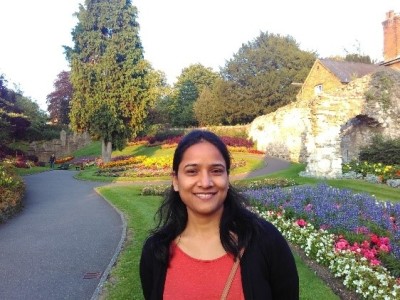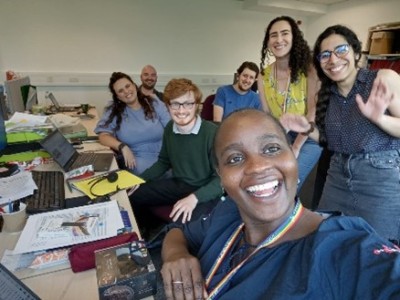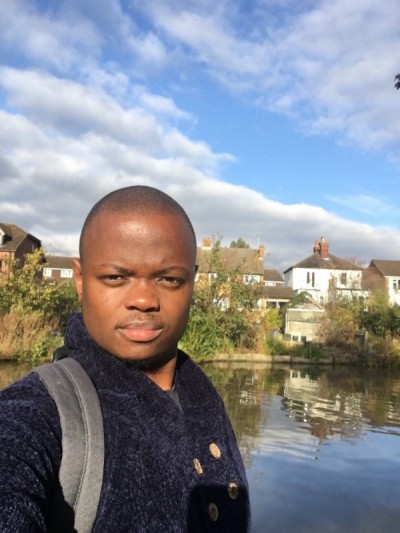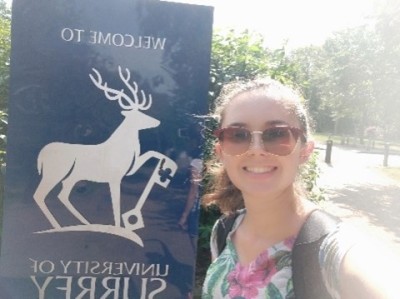University of Surrey Research Exchange
This blog and Q&A session features four researchers who have participated in exciting research exchange programmes at the University of Surrey. Each researcher shares their unique experiences, the knowledge and skills they gained, and the lasting impact these visits had on their careers.
Get ready to be inspired
- Dr Pooja Agarwal: Learn how her visits to Surrey helped her develop expertise in macrophages and tuberculosis research, ultimately leading to new publications and a postdoctoral position.
- Dr Doty Ojwach: Discover how Doty's research visits at Surrey equipped her with advanced techniques in tissue staining and angiogenesis assays, advancing her research on placental health.
- Dr Michael Zulu: Explore Michael's journey of identifying novel markers for placental macrophages and his path to becoming a successful researcher through his time at Surrey.
- Beatriz Burger: Read about Beatriz’s journey from São Paulo to Guildford to Boston, including learning how to process PBMCs and RBCs isolated from human blood samples for fatty acid quantification analyses using a gas chromatograph at Surrey.
These visits were made to the Innate Immunity Laboratory led by Dr Fernando Martinez Estrada at the University of Surrey, which is part of the Immunology section. The principal investigator as well as the members of the section were enriched by the researchers’ enthusiasm, knowledge and inspiring dedication to science and human health.
We look forward to having more visitors and collaborations that culminate in publications and grants.
Dr Pooja Agarwal

I was a postdoc fellow in Professor Valerie Mizrahi’s lab (University of Cape Town) when I first visited Dr Fernando Estrada (University of Surrey) as a part of a collaboration. This visit was in August 2018, funded by the Oppenheimer Fund – Academic Exchange programme (University of Oxford), supported by Professor Siamon Gordon.
The second visit to Fernando’s lab was between April 2018 and August 2018, and was funded by the Santander Universities Mobility Award (Surrey University).
During my visit, I mainly learnt about the isolation of PBMCs and their differentiation into macrophages. Under the guidance of Fernando, I developed different foamy macrophages models to study the pathogenesis of Mycobacterium tuberculosis. In addition, I also learnt how to use an imaging flow cytometer (Oxford University) for live cell imaging.
These two visits helped me to co-publish with the University of Surrey one article in Frontiers in Microbiology and one review in Frontiers in Immunology. The manuscripts deal with foam cells, which is the expertise of the Innate Immunity laboratory.
After my visits I secured another postdoc position at the University of Warwick (Feb 2022 to Jan 2025), partially thanks to the work done with Valerie, Siamon and Fernando.
Doty Ojwach

My first six-month visit to Dr Fernando Estrada (University of Surrey) took place from January to June 2023, facilitated by the African Research Excellence Fund (AREF). This was a collaboration with Professor Clive Gray at Stellenbosch University, Professor Siamon Gordon at the University of Oxford and Dr Fernando Martinez at the University of Surrey.
My second two-month visit was from February to March 2024, supported by The Company of Biology (COB) and the Africa Oxford visiting fellowship programme (AfOx). This opportunity allowed me to further my research and strengthen connections established during my earlier visit.
During my first visit, I learned how to perform tyramide signal amplification (TSA) tissue staining in collaboration with Dr Nicola Annels and Sunny Sunshine, using the AKOYA Phenoimager platform. I stained macrophages in placenta tissue using different antibody markers.
During my second visit, in collaboration with Dr Paola Campagnolo’s laboratory, I learned the HUVEC Matrigel angiogenesis assay. I applied this technique to macrophages to study their role in placental vasculature.
I am currently a research fellow at Stellenbosch University working to get our collaborative manuscript in preparation published.
In a collaborative effort between Stellenbosch University and the University of Surrey, we submitted a three-year grant proposal to the UK Research and Innovation (UKRI) and South African Medical Research Council (SAMRC) call. The preliminary results, enabled by the AREF research visit to Dr Fernando Estrada's laboratory, supported our application. The proposal included contributions from Professor Clive Gray at Stellenbosch University and Dr Fernando Estrada and Dr Paola Campagnolo at the University of Surrey. They are experts in HIV immunology, macrophages and microvascular biology, respectively.
I established productive collaborations with the following institutions and individuals facilitated by Dr Fernando Estrada:
- Under the guidance of Emma Clarke, I gained access to histology and automated staining platforms at the Royal Surrey County Hospital, which significantly contributed to my research.
- Dr Nicola Annels (University of Surrey) facilitated my use of the AKOYA PhenoImager equipment, which played a central role in the analysis of my project.
- Dr Paola Campagnolo (University of Surrey) enabled studies involving HUVECs and macrophages, elucidating their role in placental vasculature as a mechanism of pre-term delivery.
I made wonderful friends in Guildford and at the University of Surrey. These connections enriched my experience, both personally and professionally, creating lasting memories and valuable collaborations.
During my initial six-month visit, I stayed at the University of Surrey's Manor Park complex. Its close proximity allowed me to walk to campus, providing a good opportunity to unwind and exercise. For my follow-up visit, I initially used temporary accommodation until securing a private place, as the Manor Park complex was fully booked – attesting to its popularity and convenience.
Michael Zulu

My first visit as a PhD student was from April 2018 to October 2018. This was a collaboration between Dr Fernando Estrada (University of Surrey) and Professor Siamon Gordon and Professor Stephanie Dakin (University of Oxford). The Newton/RCUK PhD Student Exchange programme funded this visit.
My second visit as a visiting researcher/postdoctoral fellow to the Martinez lab was from April 2019 to December 2019, funded by the Skye Foundation.
We used the microarray dataset and the Human Protein Atlas database to identify novel markers of placental macrophages at the maternal-fetal interface. We used the microarray dataset to determine how the expression of these markers may be dysregulated by HIV infection.
During the visits, I also learnt R for the first time, and polished my skills on flow cytometry which was very useful for my subsequent positions.
From this visit, I published a review article in the Journal of Innate Immunology.
I then went on to do two postdoctoral fellowships at the University of California and Emory University in the United States.
I am currently an IDM fellow and a junior research fellow in the Department of Pathology, Division of Medical Virology at the University of Cape Town.
I made great friends in Guildford and at the University of Surrey.
Beatriz Burger

I was a masters student at the University of Campinas and received funding from the São Paulo Research Foundation (FAPESP) to spend four months (April–July 2019) working in Dr Fernando Estrada's lab at the University of Surrey. During this period, I also had the opportunity to work with Dr Barbara Fielding.
During my visit, I learned how to process PBMCs and RBCs isolated from human blood samples for fatty acid quantification analyses using a gas chromatograph.
After finishing my masters, I received funding from FAPESP to pursue my PhD at the University of Campinas (2020). I am currently spending a period (2022–2024) at Massachusetts Institute of Technology (MIT) in Boston (USA). In October 2024, I will return to Brazil to complete my PhD and then start a postdoc.
In 2023, I had my publication accepted in Frontiers in Immunology.
This period was the first time I was in another country and living far from my family and friends. It was an intense time of personal transformation, which made me more resilient.